News
Participation of LRA Advanced Materials Safety in Excellence Clusters
May 23, 2025
The partner institutions in the Leibniz Research Alliance "Advanced Materials Safety" are involved in a total of 12 of the Excellence Clusters approved on Thursday by the DFG.
The Excellence Cluster REC2 – Responsible electronics in the climate change era at TU Dresden is even led by two members of this alliance: Yana Vaynzof (spokesperson REC2) and Andreas Fery (co-spokesperson REC2).
Link press release DFG
Link press release Leibniz Association
Conference »Advanced Materials Safety 2025« – Abstract submission is now open!
January 17, 2025
It is now possible to submit your contribution for the »Advanced Materials Safety 2025« conference, which will take place from November 4-6, 2025 in Dresden, Germany. The conference is organized by the Leibniz Research Alliance »Advanced Materials Safety«.
For more details visit our conference homepage »Advanced Materials Safety 2025«

Transfer of coordination completed
July 1, 2024
The Leibniz-Institut fuer Polymerforschung Dresden e. V. (IPF) will take over the function of coordinating institute from the INM – Leibniz Institute for New Materials gGmbH with effect from 01.07.2024. Furthermore, the INM will leave the research alliance on 31.12.2024.
We would like to take this opportunity to thank the INM for the good cooperation over the many years.
New coordinator for research alliance
April, 15, 2024
Nicole Vilbrandt from IPF Dresden will take over the role of coordinator of the Leibniz Research Alliance Advanced Materials Safety from Christiane Petzold (INM – Leibniz Institute for New Materials gGmbH) on 15.04.2024.
The partners would like to thank Christiane Petzold for her relentless commitment to the research network and wish her all the best.
Data standard for nanosafety research data published on ‘FAIRsharing.org’

February 22, 2024
Partners of the LRA Advanced Materials Safety have published the results of one of their collaborations, a data guideline for description of research data called Minimum Information Table for the Safety of Engineered Nanomaterials (MIT Nanosafety), on the platform FAIRsharing.org. In addition, the guideline is also listed in the ELIXIR Toxicology Community Collection.
The modular table resulted from the research project NanoS-QM (2019-2021, funded by BMBF). Collaborators of the preceding Leibniz Research Alliance Nanosafety (2012-2020) developed and tested quality standards for their research area. Their aim was to improve data quality in the complex and multidisciplinary research area of nanosafety for an improved and comprehensible risk assessment and regulation. Crucial was the collaboration of experts from different areas for development and thorough verification of all parts of the MIT. Furthermore, the table was also assessed by external experts in a workshop and its usability was tested in a round robin experiment at different laboratories.
FAIRsharing.org is a platform, that describes and connects community-developed data and metadata standards, databases, repositories and data strategies. The MIT is the only listed standard on FAIRsharing.org that maps the entire process of safety research for nanoparticles and that includes the most important scientific and regualtory standards. The modular approach allows scientists of all involved research areas of nanosafety to use the standard for the aspects they are examining.
Currently, the present partners of the multidisciplinary Leibniz Research Alliance Advanced Materials Safety are using the MIT for the development of functional and accepted, safe and sustainable advanced materials, especially also in the context of electronic laboratory notebooks.
Roel Schins from IUF appointed as co-spokesperson for the research alliance
December 5, 2023
During the annual meeting of the Leibniz Research Alliance Advanced Materials Safety, Roel Schins from IUF – Leibniz Research Institute for Environmental Medicine was elected as the new co-spokesperson by the members of the allliance. He is taking over the role from Annette Kraegeloh (INM – Leibniz-Institute for New Materials).
Roel Schins in an expert in particle toxicology: “My research focuses on elucidating the mechanisms by which air pollution particles and engineered nanomaterials can cause disease in humans. I will also contribute with my experience in health risk assessment.” Roel Schins has provided expert opinion on nanomaterials safety to supranational organisations such as EU and OECD.“
Co-spokesperson Andreas Fery adds: “The research alliance is now once again represented by a team of two spokespersons. We will use use our expertise to address the effects of materials on humans and the environment.”
The partners of the Leibniz Research Alliane Advanced Materials Safety thank Annette Kraegeloh for her tireless commitment to the research alliance. She has brought us together and enriched our work with her scientific expertise and creative ideas. She will continue to support the PhD project A1: Cluster Tox. At the same time, we look forward to working with the new team of spokespersons.
Advanced materials require safety: Experts meet in Saarbrücken

November 20, 2023
Researchers from a wide range of disciplines met from November 8 to 10 for the international conference “Advanced Materials Safety 2023” on the campus of Saarland University to shed light on the topic of safety and sustainability of new materials from their respective perspectives. The conference is being organized by the Leibniz Research Alliance Advanced Materials Safety in cooperation with the INM – Leibniz Institute for New Materials in Saarbrücken.
Advanced materials make a significant and often invisible contribution to a wide range of applications, from the production of green hydrogen to catalysis, energy storage and biomedicine. They are therefore of crucial importance for the development and use of important future technologies. In advanced materials, various nano- or microscale building blocks are combined to form hierarchically structured hybrid materials. The use of different components and the many possible combinations result in a complex hazard potential that must be considered over the entire life cycle.
Andreas Fery, co-organizer of the conference and spokesperson for the Leibniz Research Alliance Advanced Materials Safety, explains: “The functionality of the materials, their effects on humans and the environment as well as the acceptance of new technologies are central topics during the conference. With the meeting, we want to bring together researchers with relevant competences and identify common interests for joint research projects that will allow us to investigate such complex challenges.”
During the three-day event, experts present their research findings in their specific areas of expertise to answer questions such as how the production of safe materials can be planned, what effects material components have on the environment and human health, what therapeutic applications are possible and how we can better predict the effects of such materials through computer-aided modeling. In addition, communication experts will present techniques and tools that help to present and convey complex issues. In a seminar on research data, participants will also exchange ideas on how to make better use of their data.
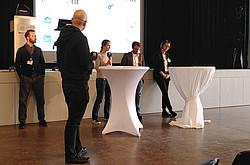
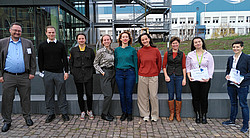
Conference »Advanced Materials Safety 2023« – Abstract submission is now open!

June 28, 2023
It is now possible to submit your contribution for the conference »Advanced Materials Safety 2023«, which will take place from 8 to 10 November 2023 in Saarbrücken, Germany.
Submit your abstract (Submission closed).
The conference provides a highly interdisciplinary forum for sharing recent advances and discussing current and future challenges in the field of advanced materials safety. It will bring together leading scientists to discuss scientific, regulatory, and application-oriented aspects of advanced materials safety in depth and from different viewpoints, with the aim to design safe and sustainable, functional, and accepted advanced materials. The conference is organized by the Leibniz Research Alliance »Advanced Materials Safety«.
Invited Speakers
- Prof. Barbara Rothen-Rutishauser:
„Predictive 3D lung models to assess the hazard of aerosolized (advanced) materials“ - Prof. Andrea Hartwig:
„Impact and mechanisms of action of metal-based nanomaterials on bioavailability and cell toxicity in advanced lung cell systems“ - Apl. Prof. Dirk Walter:
„Specific toxicity of CeO2-nanoparticles“ - Prof. Chris Eberl:
„The future of materials science and engineering: How to participate and get the most out of the digital transformation“ - Dr. Hubert Rauscher:
„Safe and Sustainable-by-Design and challenges for Advanced Materials“ - Prof. Agnieszka Jastrzębska:
„Elucidating biological response in vitro of two-dimensional Ti3C2Tx MXene“ - Dr. Ajay B. Patil:
„End-of-life perspective for advanced energy storage, mobility and electronics technology materials: a gateway to a sustainable circular economy“ - Prof. Seema Agarwal:
„Degradation and disassembly concepts for tackling plastic pollution“ - Prof. Robert Rallo
More about the conference »Advanced Materials Safety 2023«
Robin Wagner develops new methods to communicate safety aspects of advanced materials
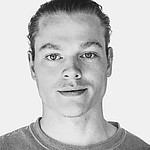
August 31, 2022
In his project C1 safe materials communication, Robin will exploit new methods of knowledge transfer utilising aspects of the research of all case studies of the research alliance. Here, Robin tells us about his approach for working with the different research fields.
Robin, please tell us about your professional background.
I completed my Bachelor and Master of Education with the major subjects Biology, Chemistry and Educational Sciences at the University of Konstanz. After finishing my Bachelor, I gained teaching experience during my practical semester in Tübingen and spent a semester abroad at the University of Gothenburg, Sweden.
What will be your job in the project?
My aim will be to investigate innovative digital formats of science communication. The content to be conveyed in these formats will be about the safety of advanced materials and they will be used in different learning contexts, such as student laboratories or exhibitions.
What made you decide to contribute to this particular project?
I am very excited about being able to combine different disciplines, such as natural sciences and educational sciences, in this project. Especially the use of innovative digital methods, such as 360° videos, to impart knowledge on this important topic appealed to me.
Where do you see the biggest challenge?
Due to the interdisciplinary approach of the project, effective planning, organisation, and communication among each other will be an important aspect.
I also believe that breaking down complex content and findings from many different research areas to their essentials, without neglecting crucial elements, will be another key element in the field of science communication.
How do you deal with the fact that you will be working at several institutes and that several research institutes are involved in your project?
I see this collaboration as a great opportunity, as it will give me many insights into different areas of research. I look forward to meeting people from this field and learning from them and their work.
Thank you Robin! Welcome to the team, we are looking forward for testing the methods you are going to come up with in your project.
Elana Kysil takes up her project to study environmental impact of advanced materials
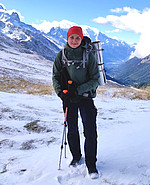
August 31, 2022
In her project, Elana will examine the effects of some of the materials that were developed and characterized in other case studies on marine organisms as well as aquatic and terrestrial plants. In this short interview, she introduces herself and tells us what a well-sized backpack has to do with it.
Dear Elana, please tell us about your professional background.
I am a biologist by training. However, during the last several years my focus shifted significantly to mass spectrometry and its application to natural products research and biochemistry. My Bachelor’s and Master’s theses were to some extent related to neuroscience (genetic engineering of serotonin transporters in zebrafish and modelling of Alzheimer’s disease in cell cultures), but after getting my degree I spent more than two years in the mass spectrometry facility of Leibniz Institute of Plant Biochemistry and gained some experience in plant metabolomics.
What will be your job in the project?
Here my aim will be to investigate the impact of advanced materials on aquatic and terrestrial plants and marine organisms including corals and foraminifera in controlled experiments. Such an impact might be seen on a level of biochemistry as well as on physiological, or sometimes even per se morphological, level (such as the incorporation of the nanoparticles into the skeleton of corals or foraminifera). Therefore, my task will be to address the changes in the metabolome [the metabolome comprises all characteristic metabolic properties of a cell, tissue or organism] of the affected organisms, but also other physiological reactions, such as uptake and excretion of the particles.
What made you decide to contribute to this particular project?
The rapid development of our society puts an enormous burden on ecosystems. Even though we, as humanity, start to invest substantial resources in applied ecology, yet the effects of water pollution remain understudied and surely underestimated. Even less prominent are real actions. Surely, we will not change the world with one, two, or even a hundred projects. But we might shed a couple of photons on the matter and hope that humanity still has enough time to make a difference.
Among the more grounded goals I also plan to broaden my knowledge in the field of metabolomics and further develop soft skills that a person needs to bring any project, disregard of the topic, to a successful “Conclusion” section: effective communication, planning, and exploitation of resources.
Where do you see the biggest challenge?
The biggest challenge for me is to develop such kind of healthy self-confidence that I know my limits and that the other people in the project group can rely on me and trust me. Letting people down by ignorance or incompetence is the worst, everything else just needs time and practice to accomplish. I hope that I can also rely on the people around me because mutual trust and responsible attitude make great achievements. Growing such bonds with colleagues takes time and it is one of the most challenging and important things in life.
The other thing is to dive back to old-school biology again and work with whole organisms, not just molecules. It is like putting on the old winter shoes that you used to wear a lot in the past, but a very long time ago. I feel a vibe of Ruppert’s “Invertebrate zoology” and biological drawings on a seashore again.
How do you deal with the fact that you will be working at several institutes and that several research institutes are involved in your project?
Well, I had to move from country to country several times, to work in very different places, and finally, I have a comfortable middle-size backpack for traveling. So, I hope that I can handle it again.
Thank you Elana and welcome to the research alliance! We look forward to working with you.
Olga Kuharenko – PhD at the interplay of chemistry and biology

August 31, 2022
Olga Kuharenko moved 1000 km to start her PhD project Cluster Tox at the Leibniz Institute of Polymer Research Dresden. Halfway through her project, she will move another 500 km to Saarbrücken to finalize her work at Leibniz Institute for New Materials. Read here why she chose this path:
Dear Olga, tell us about your professional background.
I completed my bachelor’s and master’s in chemistry at the Belarusian State University (BSU) in Minsk. During my studies I worked for four years at the Research Institute for Physical Chemical Problems of the BSU in the field of polymer chemistry. The projects I was involved in were mainly devoted to the synthesis of well-defined macromolecular structures, their characterization and application.
What will be your job in the project?
I will synthesize nano-sized hybrid polymer/inorganic advanced materials and investigate how their architecture and macromolecular functionalization influence their cellular uptake and intracellular targeting, stability, as well as toxicity. Understanding the behavior of these nanoclusters in living cells in the future could for instance be used to develop targeted drug delivery systems for cancer treatment.
What made you decide to work in this particular project?
I see the interdisciplinary nature of the research as a great possibility for my professional development. For instance, I will be gaining knowledge and hands-on experience in cell biology – a totally different research field with new investigation approaches, analysis techniques and so on.
Where do you see the biggest challenge?
For me personally working as a chemist and as a biologist in a highly interdisciplinary environment will be a main challenge and also the greatest benefit.
How do you deal with the fact that you will be working at several institutes and that several research institutes are involved in your project?
I see this as a unique opportunity that will broaden my horizon and give me new knowledge, skills and contacts useful for my future scientific career.
Thank you Olga and welcome to the research alliance! We are looking forward to working with you.
Arianna Borgers – PhD at IfADo in case study B1: dissolution control

July 29, 2022
As the first PhD student of the research alliance, biologist Arianna Borgers already started her work at IfADo in July. Here she introduces herself briefly:
Dear Arianna, tell us about your professional background.
I completed my bachelor’s degree in biology at the Westfälische Wilhelms University in Münster. As I was particularly enthusiastic about biomedical issues during my studies, I subsequently decided to do my master’s degree in medical biology at the University of Duisburg-Essen. During internships and my master’s thesis, I was mainly involved in cancer research at Westdeutsches Tumorzentrum (translates to “West German Tumor Center”) in Essen.
What will be your job in the project?
The topic of my dissertation belongs to project area B, so I will deal with the influence of advanced materials, more precisely metal oxide nanoparticles, on human health. In this context, I am planning to investigate how these nanoparticles dissolve inside cells, which cell responses they cause and to what extent they have a toxic effect on cancer, nerve or liver cells. Controlling the release of metal ions and the associated toxicity could possibly in the future be of great benefit in cancer treatment therapies, for example.
What made you decide to work in this particular project?
The project appealed to me immediately because, on the one hand, it involves a biomedical context related to cancer research and, on the other hand, it provides new, exciting topics and methodologies for me. I also really liked the fact that the doctoral program includes workshops on science communication, among other things.
Where do you see the biggest challenge?
I think the biggest challenge could generally be in the organization. Especially in such a current field of research, it is important to keep track of current developments while always keeping your goal clearly in mind.
How do you deal with the fact that you will be working at several institutes and that several research institutes are involved in your project?
I actually really like the fact that several research institutes are involved in my project. I am looking forward to the interdisciplinary exchange with the participating institutes and hope that this will provide me with some new food for thought and perspectives for my project.
Thank you Arianna! Welcome to the research alliance, we are looking forward to working with you.
Kick-off Meeting
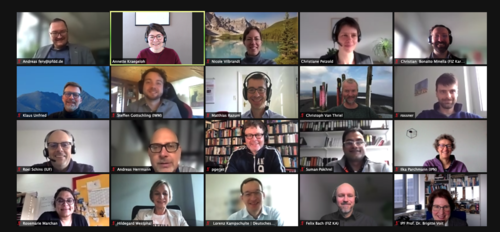
At our kick-off meeting on January 13, all project partners presented their individual projects and contributions to the research network. The first PhD projects are due to start as early as the middle of the year, with some of the doctoral students conducting research at several of the institutes. These are now being prepared.
We look forward to working with all partners in the research network!
Gebündelte Expertise für die Sicherheit Innovativer Materialien: Der Leibniz-Forschungsverbund Advanced Materials Safety geht 2022 an den Start

Photo by Erwan Hesry on Unsplash
Following the decision by the Senate of the Leibniz Association, the Leibniz Research Alliance Advanced Materials Safety can begin its work in January 2022 and build on the successful work of the Research Alliance Nanosafety. Over the next four years, 12 Leibniz Institutes working on the production and research of advanced materials, the investigation of the effects of these materials on humans and the environment, research into knowledge transfer and the development of digital infrastructures will cooperate in several sub-projects.
The partner institutes from four sections contribute to expanding current knowledge, developing sustainable and safe advanced materials and transferring this knowledge to society. The further development of a digital infrastructure in which research data can be used across disciplinary boundaries, the interdisciplinary training of young scientists and science communication are important, overarching pillars of the concept.
The Leibniz Research Alliance Advanced Materials Safety in brief:
Duration: 2022 - 2025
Spokespersons: PD Dr. Annette Kraegeloh (INM) & Prof. Dr. Andreas Fery (IPF)
Coordinator: Dr. Christiane Petzold (INM)
